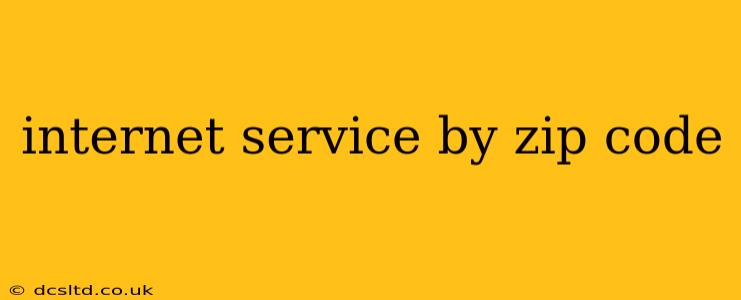Finding the right internet service provider (ISP) can feel like navigating a maze. With so many options and varying speeds, prices, and packages available, knowing where to start can be overwhelming. This guide will help you pinpoint the best internet service by zip code, ensuring you choose a provider that meets your specific needs and budget.
What Internet Options Are Available in My Zip Code?
This is the crucial first step. Different areas have different infrastructure, leading to a variety of available services. You might find options like:
- DSL: Digital Subscriber Line uses your existing phone line to deliver internet, offering relatively slower speeds but often wider availability in rural areas.
- Cable Internet: Utilizing your existing cable TV infrastructure, cable internet generally offers faster speeds than DSL but can be more expensive.
- Fiber Optic: The fastest option currently available, fiber optic internet uses light signals transmitted through thin glass strands to deliver incredibly high speeds and low latency. However, fiber availability is still expanding and may not be available in all areas.
- Satellite Internet: A viable option for those in remote areas with limited access to other services. However, satellite internet typically offers slower speeds and higher latency than terrestrial options due to the long distances signals must travel.
- Fixed Wireless: This uses radio waves to transmit data to a fixed location, often a good option for areas with limited infrastructure. Speed and reliability can vary depending on factors like distance to the tower and interference.
How to Find Internet Providers by Zip Code?
Several methods can help you identify available internet providers in your specific zip code:
- Online Search Engines: A simple Google search of "internet providers [your zip code]" is a great starting point. This will often list various providers serving your area, along with their services and pricing.
- Provider Websites: Major internet providers often have zip code lookup tools on their websites. Inputting your zip code will show whether their services are available in your area.
- Comparison Websites: Many websites specialize in comparing internet providers and their plans. These tools can help you easily compare speeds, prices, and features to find the best fit for you.
What Internet Speed Do I Need?
Choosing the right speed depends on your usage. Consider the following:
- Streaming: High-definition streaming requires significantly more bandwidth than standard definition. 4K streaming needs even higher speeds.
- Gaming: Online gaming, especially multiplayer, requires low latency (ping) and consistent upload/download speeds.
- Working from Home: Video conferencing and file sharing require sufficient bandwidth to avoid lag and interruptions.
- Number of Devices: The more devices connected to your internet simultaneously, the higher speed you'll need.
How Much Should I Expect to Pay for Internet Service?
Pricing varies greatly depending on location, provider, and speed. However, you can generally expect to pay anywhere from $40 to $100 or more per month for residential internet service. Factors influencing cost include:
- Speed: Higher speeds typically mean higher costs.
- Data Caps: Some providers impose data caps, charging extra for exceeding a certain amount of data usage.
- Contract Length: Longer contracts often come with lower monthly rates, but less flexibility.
- Bundled Services: Bundling internet with TV or phone service can sometimes offer discounts.
What About Internet Availability in Rural Areas?
Internet access can be a challenge in rural areas. Options might be limited, with slower speeds and potentially higher prices. Government programs and initiatives are working to expand broadband access in underserved areas. Check with your local government or the FCC (Federal Communications Commission) for information on potential programs in your area.
How Can I Compare Internet Plans?
Once you've identified available providers, compare plans based on:
- Download and Upload Speeds: Pay close attention to both download and upload speeds, as upload speeds are increasingly important for activities like video conferencing and file sharing.
- Data Caps: Check for data caps and associated overage charges.
- Contract Terms: Understand the contract length and any early termination fees.
- Customer Service: Look for reviews and ratings of the provider's customer service.
- Hidden Fees: Be aware of potential hidden fees, such as equipment rental or installation charges.
Finding the best internet service by zip code requires research and careful comparison. By following the steps outlined above, you can ensure you choose a provider and plan that meets your needs and fits within your budget. Remember to check for availability in your specific area, and don't hesitate to contact providers directly with any questions.
